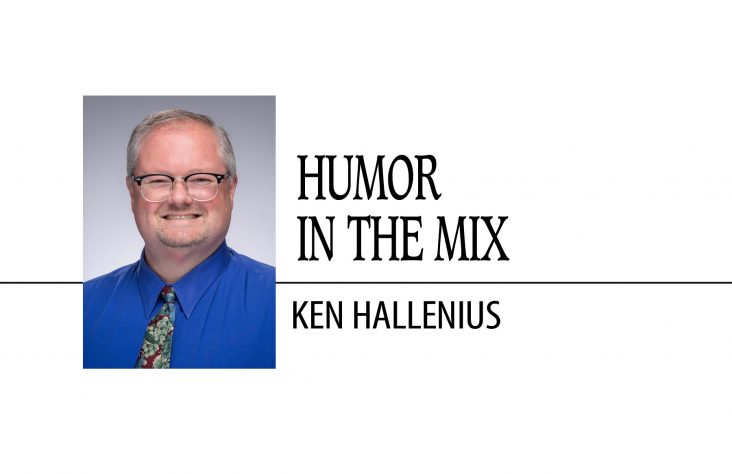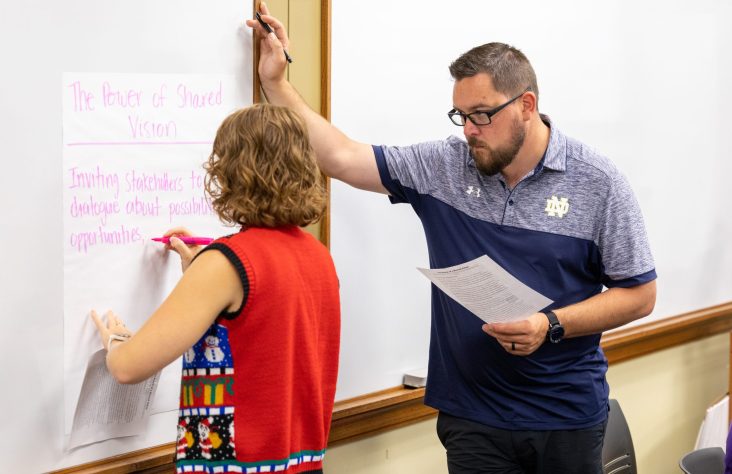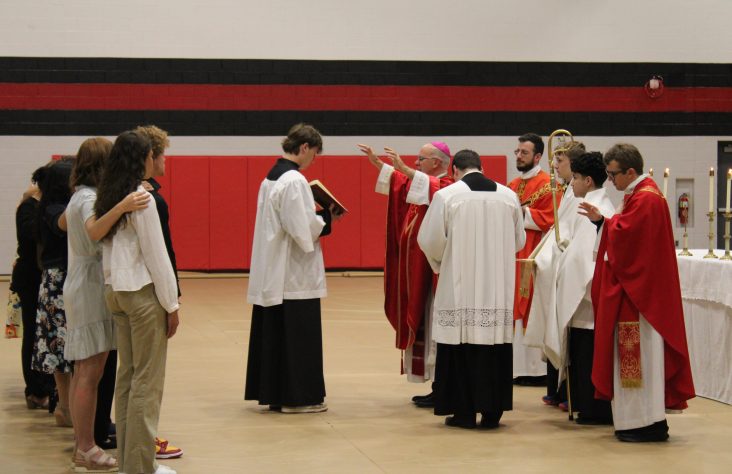January 11, 2011 // Uncategorized
Reflection on first anniversary
This past week, I gave an interview to a local television station on my first year as Bishop of Fort Wayne-South Bend. It was a very pleasant interview as the reporter asked many good questions which provided an occasion to review my experiences this past year. At the end of the interview, the reporter asked me to sum up my feelings after one year as bishop here. I had a hard time thinking of one word to sum up my experience. Thinking about this the next few days, one word clearly came to mind. That word is GRATEFUL.
As the first anniversary of my installation as your bishop approaches, my heart is filled with gratitude to the faithful of our diocese for their warm welcome and kindness the past 12 months. I truly feel at home here, thanks to the goodness of so many, beginning with Bishop D’Arcy, my predecessor. Thinking back to this time last year, I remember how gracious Bishop D’Arcy was as I prepared to begin my episcopal ministry here. His kindness and graciousness have continued throughout the year.
I am deeply grateful to the priests of our diocese who are my wonderful coworkers in pastoral ministry. I have enjoyed every presbyteral gathering and also my frequent encounters with our priests in my office and in parishes throughout the diocese. These hardworking and faithful servants of the Lord have been a great support. I am very grateful to our priests for their commitment to Christ and His Church. I also thank our deacons and our seminarians who are also an inspiration through their faith and devotion.
We have many religious sisters, priests, and brothers in our diocese whom I have enjoyed getting to know throughout this past year. I am grateful to them for their kindness to me and for their example of consecrated life. They remind us all of our call to holiness in following Christ along the way of the Beatitudes.
I am deeply grateful to all the dedicated employees of our diocese and all who work in our parishes, schools, and other institutions. This cohort of workers serves the Church with much zeal and commitment. And there are many others who are very active in the Church in volunteer capacities, sharing their time and talents in serving others.
During this past year, I have met thousands of lay faithful throughout the diocese who have also kindly welcomed me. I thank all of you for your example of faith, for living the Catholic faith through active participation in the Body of Christ, the Church.
So, in thinking of one word to describe my feelings on this first anniversary, I would have to say “grateful.” I thank all of you for your kindness, goodness, and love.
In reflecting on my approaching first anniversary which I will spend doing a pastoral visit to Saint Joseph’s High School in South Bend, I thought about my first homily here in the diocese. It was during Vespers at Saint Matthew Cathedral on the eve of my installation. I reflected on a verse from the Acts of the Apostles which described the life of the primitive Christian community in Jerusalem: They devoted themselves to the apostles’ instruction and the communal life, to the breaking of bread and the prayers.
In this one verse (Acts 2:42), we read four key elements of the life of the Church at its origins and throughout history. I wish to share with you what I preached about these four elements in my first homily here in our diocese since they express the key priorities of my service as your bishop:
1. They devoted themselves to the teaching of the apostles.
The Church is born of, and continually nourished by, the word of the Lord that comes to us from the apostles. “From the beginning, the first disciples burned with the desire to proclaim Christ” (CCC 425). In their trial before the Sanhedrin, Saints Peter and John said: “We cannot but speak of what we have seen and heard” (Acts 4:20).
My brothers and sisters, as I begin my ministry among you, I wish to focus on this key mission of the Church: evangelization, the proclamation of Christ in our diocese and in our world today. I hope and pray that we will have that zeal and enthusiasm of the early Christians and have that passion expressed by Peter and John: “We cannot but speak of what we have seen and heard.” Clearly this will be one of my first priorities since this is the Church’s fundamental mission. I invite you and all the people of our diocese to be renewed in this holy task of spreading the faith and of inviting others to enter into the joy of our Catholic faith.
I wish to affirm this evening my firm commitment to Catholic education since one of our most important duties is to pass on the faith to our children and young people. Like the first Christians, we must be devoted to the teaching of the apostles, to the mission of catechesis. Let us allow ourselves to be filled with the ardor of the apostolic preaching which followed Pentecost. As I prepare to become your bishop, I am reminded of Saint Paul’s burning conviction when he cried out: “Woe to me if I do not preach the Gospel” (1 Cor 9:16).
2. They devoted themselves to communion or fellowship (in Greek, koinonia).
This too is an essential element of the life of the Church of all ages. We read in the Acts of the Apostles that the first Christians were of “one heart and one soul” (Acts 4:32). This unity is a gift of the Holy Spirit. We are called to be of “one heart and one soul,” to be united in a communion of love.
We must be faithful to the teaching of the apostles, united with the Holy Father and the bishops of the Church, united in truth and charity! With the help of the Holy Spirit, we must promote a spirituality of communion, one in which our profound unity in Christ is truly lived and practiced as brothers and sisters in Christ.
We are called by the Lord to share one another’s joys and sufferings, to attend to one another’s needs, to be committed to practical and concrete love for every human being (Novo Millennio Ineunte 49), especially the poor and suffering in our midst. Our mission of charity necessarily includes a deep commitment to respect for the life of every human being from conception until natural death. In his first encyclical, “God is Love,” Pope Benedict reminded us that the Church is a community of love and he said that “the Church cannot neglect the service of charity any more than she can neglect the Sacraments and the Word.” Practical love for the least of our brothers and sisters must be a decisive feature of our life as a diocese, as a community of Christ’s disciples.
3. They devoted themselves to the breaking of the bread.
The Holy Eucharist is truly the vital center of our lives. It was for the early Christians. It is for us today. Why is this? Because the Eucharist is Christ Himself. It is Jesus who gives Himself to us. It is His redeeming sacrifice made present on the altar. That is why Pope John Paul II could say in his great final encyclical, which was on the Eucharist, that “the Church draws her life from the Eucharist.”
One of our top priorities must be the rekindling and strengthening of Eucharistic faith. One of the biggest challenges we face today is the need for the recovery of the importance of attendance at Sunday Mass. As I become Bishop of Fort Wayne-South Bend, I wish to issue a deep appeal to all Catholics of the diocese who do not regularly attend Mass to start anew and make the Eucharist the heart of their observance of Sunday. This is not only a fundamental duty of Catholics and a mark of our Catholic identity, it is a necessity for living fully our life in Christ! I invite our priests and our parishes to make the promotion of Sunday Mass attendance a priority in their mission of evangelization.
Let us recall the example of the fourth century martyrs of Abitanae in North Africa who defied the orders of the emperor when he forbade Christian worship. They declared that it was not possible for them to live without the Eucharist and accepted martyrdom rather than not observe the Lord’s Day. The Holy Eucharist is such an amazing gift and mystery. As the great John Paul said: “In the humble signs of bread and wine, changed into his body and blood, Christ walks beside us as our strength and our food for the journey…” (Ecclesia de Eucharistia 62).
4. They devoted themselves to the prayers.
In all we do and in all our pastoral activity, we must be conscious of the primacy of grace. Prayer reminds us of the truth that without Christ, we can do nothing. He is the vine and we are the branches. Our works will not bear fruit unless we are grafted onto the vine who is Jesus. From the beginning, the first Christians were devoted to prayers of praise and petition. This evening, we are praying together the Evening Prayer of the Church, a beautiful part of our Catholic tradition.
We have such a rich spiritual patrimony: Besides the Mass and sacraments, we have Eucharistic adoration, the Liturgy of the Hours, lectio divina (prayer with Scripture), the holy rosary, and many other beautiful devotions. God wills our sanctification. He calls each of us to holiness according to our different states in life. Our parishes are to be schools of prayer, places where our people truly meet the Lord Jesus and fall in love with Him. We will not really progress along the journey of holiness unless we are men and women of prayer. Let us help one another on this journey by praying often for one another.
As we continue with Vespers this evening, let us remember the life of the early Christians in Jerusalem. “They were devoted to the apostles’ instruction and the communal life, to the breaking of bread and the prayers.” As I am about to begin my episcopal ministry among you, I have recalled these key elements of the Church’s life. They will be key priorities in my service to you. May the Blessed Virgin Mary, the Queen of Apostles, intercede for us and for all the people of the Diocese of Fort Wayne-South Bend!
The best news. Delivered to your inbox.
Subscribe to our mailing list today.





